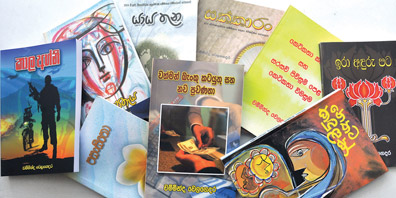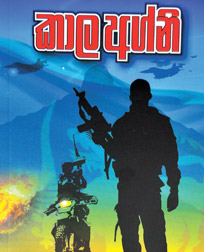|

From delight to wisdom
Sachitra Mahendra
Chamminda Welagedara is quite an old hand in the creative fiction.
His contributions are manifold: banking, management, documentaries,
short stories and novel. Managing time for banking, personal life and
creative writing, he would sleep only four hours. Quality is more
important than quantity, Welagedara believes firmly - he has allocated
himself a considerable time for research. An Assistant General Manager
at the Bank of Ceylon Head Office, Welagedara is an award-winning
author. In 'Kala Agni', his latest novel, he narrates the tragedy of
war-torn victims.
 |
|
Chamminda
Welagedara.
Picture by Saman Sri Wedage. |
Q: 'Kala Agni' deals with post-war social trauma. Although
many writers have touched war literature, they have been looked down as
they have no first hand experience. You will also have to face the same
criticism.
A: When Malini Fonseka acts as a poor peasant woman, no one
will question how she would do justice to her role. I am not finding
fault with your question or the veteran actress, but only writers are
faced with this question.Yes. It is difficult to capture the atmospheric
feel. I think I am qualified to deal with war fiction precisely because
I am a common man.
I witnessed this war for the last 30 years as a common man. I had
been following all those reports in media. I had the chance of
exchanging ideas with my fellow people too.
Q: How does your profession contribute to your creative
writing?
A: As a state bank we get to meet people from all walks. Many
people with low income approach and share their burdens with us. It
reached a good turning point when I worked in eastern region - that
experience was quite useful.
I would have written 'Kala Agni' even without that experience. But I
required that to be quite honest and truthful to my readers. If I am to
give something, that must come from the bottom of the heart. What I
heard from those people, exchanged with those people, was quite
fruitful.
Q: When a creative work includes war scenes, it is apparently
labelled as war fiction. Do you call 'Kala Agni' as war fiction?
A: More than war fiction, I would call it a novel describing
circumstances of war. I am not taking sides, but we did not win the war.
War is not something you can win. You declare war, because you have
lost.
Most people in the eastern region, both Tamils and Sinhala, suffer
from lack of knowledge. They face a different war. They need to overcome
the fear of ignorance. That is what I wanted to emphasize in this work.
Q: In Sri Lanka only a few authors can make a living by their
books. If a book sells more than 3000, it will be a rare case. And the
book reading habit is also said to have dropped fast. Even so, the
market is overflowing with books.
A: As you indicated, many authors have no professional way of
earning.Sri Lanka does not have a lucrative market for books, compared
with European countries. That does not mean people do not read or buy. A
lot of people borrow a book and read. That the people cannot afford the
price of books is simply a myth.
 If that is so why are they ready to pay Rs 500 for a musical show and
more than that for junk food and drink? Expensive eating houses are
crowded. They don't do this once a year, like they shop for books in
September. They do it frequently. If that is so why are they ready to pay Rs 500 for a musical show and
more than that for junk food and drink? Expensive eating houses are
crowded. They don't do this once a year, like they shop for books in
September. They do it frequently.
I remember my university period. The clerical staff used to buy
books. Even now the books sell because of such people.
Even people with low income would buy some affordable book. They
liked to own a book and read.
On the other hand, there are authors who claim to have their books
sold more than 30,000 or 40,000 copies. Well, I am not prejudiced to
call them silly publications. I am happy if they sell more than 30,000.
But my problem is neither on the quantity of books in the market nor
their saleability, but their quality.
Q: How do you gauge quality?
A: True, we cannot lay down judgement as to how a novel should
be. And I believe a novel must not give any advice. A novel must give
you something to think.
It must develop your wisdom. It must be like from delight to wisdom.
Q: Your novels give prominent place to descriptions and
analyses, perhaps more than the storyline. Do you think that technique
attracts a reader?
A: We like to read story. We were used to hear a story from
someone else's mouth. We were ready to listen more than reading. Jataka
book is the best example. Every Jataka story has a simple plot. We were
well satisfied with the plot and forgot the rest. We did not care for
other details of the story.
So we easily forgot the fact that the story has more than a mere
story. If a book is on a prostitute, then it might have something more
than incidents and characterization.
Why she has taken up that job, and how she deal with some traumatic
experiences.That's where a hidden layer rests. We do not want to touch
that area. We simply watch a picture, but do not read deep into it. If a
colour is red, we just identify it is red. We are not bothered to find
out why it became red.
 Q: Is 'reading deep' essential? Q: Is 'reading deep' essential?
A: Yes. Reading deep enlightens your thinking. That makes you
look around differently. You will understand things better.
Q: How did analytical descriptions help your creative works?
A: I deal with the leftist movement in 'Sappurisa'. When we
plant a certain plant, we have to think about climate, water and so on -
whether they are in right condition. What grows well in freezing regions
do not grow in a tropical region.
Same goes for the leftist movement. They tried to implant it here as
it is with no ground research.I needed descriptions to elaborate this
fact.
Q: You use simple, classical and sometimes regional dialect.
A: Thanks to my poor farmer parents, I was lucky enough to
learn environment.
Then the teachers from pirivenas. They had an ample command of
Sanskrit, Pali, Sinhala and English. I do not know how far my works have
become, but my parents and teachers influenced me quite a lot. |







